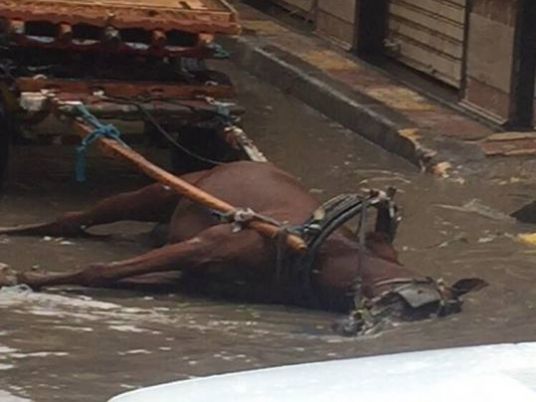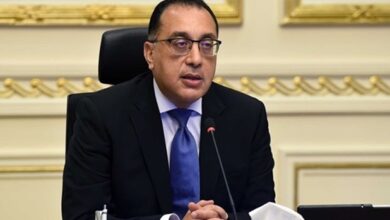Political forces and human rights activists voiced mixed feelings over the recent police shake-up, which ended the service of at least 600 high-ranking officers.
Interior Minister Mansour al-Essawy announced the release of 505 generals, 82 brigadiers and 82 colonels from service during a press conference Wednesday, after renewed protests rallied around calls to suspend police under investigation for killing revolution protesters. Among those 669 officers forced into early retirement were 27 implicated in the killings, according to Essawy. Mohamed Mahfouz, a former police officer, said that the officers would still be entitled to their pensions.
“It is a good step that paves the way for a restructuring [of the police],” said Waheed Abdel Meguid, a political analyst with Al-Ahram Center for Political and Strategic Studies. “But we still need to examine the details of the shake-up in order to verify the names of those stopped and see if any of the generals over whom there were reservations is still in office.”
The move comes on the heels of sweeping protests and sit-ins that erupted in several provinces nationwide. Last week, hundreds of thousands took to the streets demanding the overhaul of the Interior Ministry and the conviction of officers implicated in killing at least 846 people during the 18-day uprising, among other demands.
“This is a step forward, nobody can deny that,” Mohamed al-Qassas, representative of the 25 January Revolution Youth Coalition, told Al-Masry Al-Youm. “Yet, there are still more measures to be taken in order to purge the Interior Ministry.”
Thousands of protesters are still demonstrating in Cairo, Alexandria and Suez.
Although the Interior Ministry markets the reshuffle as “a historic” and unprecedented move, Qassas said it does not provide enough incentive to halt the sit-in in Tahrir Square. The ministry should disclose the identity of “snipers” who killed protesters from rooftops during the uprising, he said.
Essawy has repeatedly denied reports that the Interior Ministry used snipers.
“Who shot the people then? I saw them [snipers] with my own eyes,” Qassas said.
Essawy also announced the relocation of 4000 officers including 54 low-ranking officers who are accused of involvement in killing protesters. As the law did not allow for firing these officers, said the minister, they were posted in divisions where they would not be required to deal with the public.
“The relocation of someone who is involved in a murder case would not lead to purging the ministry,” said Magda Boutros, researcher with the Egyptian Initiative for Personal Rights. “Using relocation just to calm people down is not acceptable.”
The move comes less than a week after Prime Minister Essam Sharaf told the nation in a televised speech that he ordered Essawy to remove all officers implicated in the killings even before the court hands down verdicts. His declaration was seen as an attempt to contain public outrage.
However, Human rights activists do not view the release and transfer of officers as a major concession to protesters.
“We should not be tempted with this shake-up. It is very normal and it happens routinely every year,” said human rights lawyer Amir Salem.
Former police officer Mahfouz agreed with Salem, saying that at this time each year, the ministry typically ends the service of a number of high-ranking officers based on their performance.
Mahfouz insisted that officers implicated in any crime should be referred to a disciplinary board and not just suspended or released from duty.
“Ending their service without doing that is just nonsensical,” said Mahfouz who was himself sacked from Mubarak’s police apparatus after having written a novel negatively portraying Egypt’s political realities.
For decades, the police apparatus served as the backbone of Mubarak’s regime. The 83-year-old pilot had expanded the police corps and allocated a significant share of the budget to the Interior Ministry. Besides maintaining public order, the police became entrusted with protecting Mubarak’s rule, and systematically used torture to do so, according to local and international human rights organizations.
In recent weeks, political forces have vocally complained about the laxity in restructuring the police. Many have put the blame on Essawy and demanded his dismissal.
According to Bahey Eddin Hassan, director of the Cairo Institute for Human Rights Studies, a real purge of the Interior Ministry would have required the referral of officers to internal disciplinary boards that would question them over crimes they allegedly perpetrated not only during the revolution but also during Mubarak’s three-decade-long rule.
But Hassan does not blame Essawy for failing to carry out such a purge. Instead, he holds the Supreme Council of the Armed Forces responsible for incremental and slow-paced reforms.
“It [SCAF] has put a ceiling to the whole political process. They believe the problem lay only in Mubarak, his son, some corrupt officials and some extremist officers,” said Hassan.
“Yet, the revolution forces want radical changes in all institutions.”
The now-disbanded State Security Investigative Services was the most notorious and penetrative wing of Mubarak’s police agency. This body served the political function of forging elections, scrutinizing and intimidating political parties, syndicates, labor unions, student unions and the media, among others.
In March, hundreds of protesters marched on several State Security offices in Cairo and Alexandria. In Nasr City, they broke in one of the most infamous security offices, retrieving many classified or secret documents.
Eventually, the Interior Minister ordered the dissolution of apparatus, the firing of dozens of high-ranking officers, and in its place, the creation of the National Security Council tasked with internal security and anti-terrorism efforts.
“Officers who were holding crucial dossiers should be held in custody or put under close scrutiny,” said Salem, who believes that firing security heads is not enough.
“These officers are still acting against national interests, they are part of the counterrevolution,” added Salem, who blames the ex-officers for sectarian tension and the mobilization of radical Islamists in the wake of the revolution.
Earlier this week, a group of non-governmental organizations, independent activists and academics put forward an elaborate plan to revamp the Interior Ministry.
Their proposal advocates immediately suspending all officers accused of killing protesters until they can be tried in court, banning any attempt to intimidate martyrs’ families to drop their charges, removing members of the Supreme Police Council who were in office during the revolution and referring them a disciplinary council, disclosing investigations into the cases of snipers and enforcing a system in which civil society monitors police practices.
The proposal also urges the immediate relocation of police officers working for the criminal investigation department to other divisions and their replacement with reputable colleagues.
“Unfortunately, the criminal investigation department is more of a corrupt school,” said Mahfouz. “It was this division that raised thugs and forged elections with the help of the State Security apparatus.”
The document also sets a blueprint for long-term reforms: abolish the Central Security Forces, which includes the riot police used by Mubarak to crush protests, revise police academy curriculum, give officers better training, improve police working conditions and wages to ensure integrity, and appoint an interior minister with no police background.
“We are calling for the appointment of a politician who comes from outside the police apparatus as interior minister, so that security issues be handled from a social political perspective,” read the proposal.
“Today, we sent this proposal to the Interior Ministry, cabinet, the SCAF, the public prosecutor and the Supreme Judicial Council,” Boutros, whose group is one of the proposal’s sponsors, told Al-Masry Al-Youm on Wednesday.
The groups and activists behind the proposal also plan to put it to public debate during conferences across various governorates, said Boutros.
For Abdel Meguid, comprehensive reform can only be achieved by an elected government that has enough popular backing to embark on radical and bold changes.




